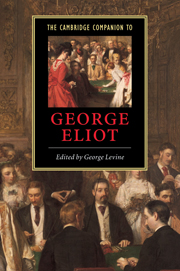Book contents
- Frontmatter
- 1 Introduction
- 2 A woman of many names
- 3 The early novels
- 4 The later novels
- 5 George Eliot and philosophy
- 6 George Eliot and science
- 7 George Eliot and religion
- 8 George Eliot and politics
- 9 George Eliot and gender
- 10 George Eliot and her publishers
- 11 George Eliot
- 12 Works cited and further reading
- Index
1 - Introduction
Published online by Cambridge University Press: 28 May 2006
- Frontmatter
- 1 Introduction
- 2 A woman of many names
- 3 The early novels
- 4 The later novels
- 5 George Eliot and philosophy
- 6 George Eliot and science
- 7 George Eliot and religion
- 8 George Eliot and politics
- 9 George Eliot and gender
- 10 George Eliot and her publishers
- 11 George Eliot
- 12 Works cited and further reading
- Index
Summary
By the time George Eliot died on December 22, 1880, she was celebrated as the greatest of contemporary English novelists. But unlike the most famous of literary Victorians, Charles Dickens, whose popularity - if not his literary reputation - survived the sophisticated ironies of literary modernism, George Eliot fell into the disrepute that attended almost all things Victorian in the early twentieth century. The two great writers were, in most respects, polar opposites; Dickens the great popular entertainer, George Eliot the voice of a higher culture, learned, self-reflexive, tormented by her own aesthetic and moral aspirations. It was her deep seriousness and determined pursuit of respectability that, ironically, turned modernist writers - many of them, clearly, her direct literary descendants - away from her. Dickens survived their condescension because his popularity never flagged, his comic and melodramatic energy seeming almost to transcend their wide appeal. But George Eliot - half refusing that kind of spectacular popularity, hoping that it might be achieved without compromising her strenuous moral and aesthetic standards - became for almost half a century something of a monument to an era whose name, Victorian, is almost synonymous with prudishness and humorless solemnity.
- Type
- Chapter
- Information
- The Cambridge Companion to George Eliot , pp. 1 - 19Publisher: Cambridge University PressPrint publication year: 2001
- 7
- Cited by

